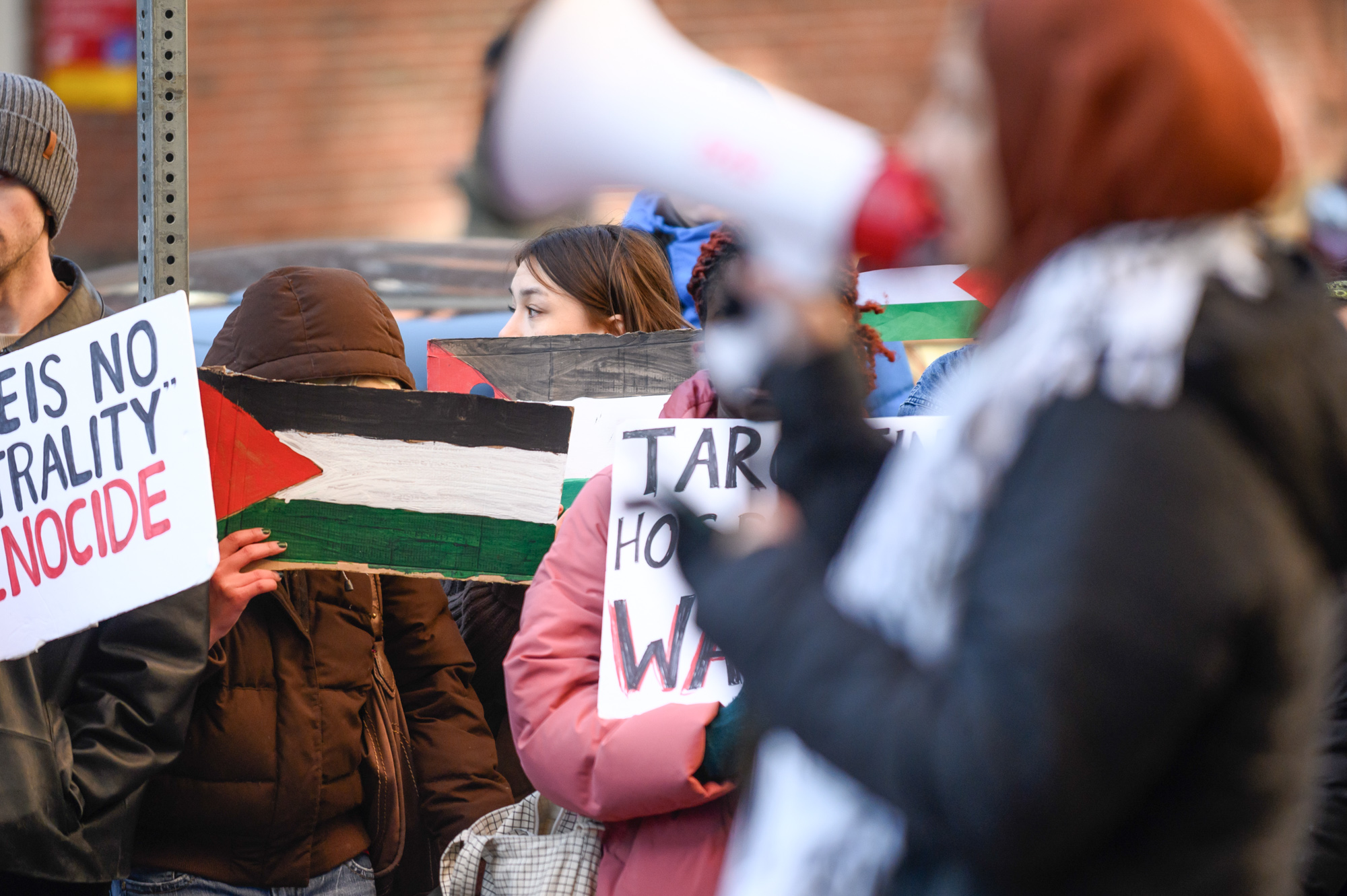Student protesters called for a cease-fire in Gaza and the divestment of BU funding from companies supporting Israel.
Boston University Students for Justice in Palestine led the protest, which marched from Marsh Chapel to 1 Silber Way.

“This protest is mainly directed towards increasing the call for divestment from our university endowment from companies or investments that are complicit in supporting the Israeli government or the State of Israel,” said Faisal Ahmed, a senior in the College of Arts and Sciences and member of BU Students for Justice in Palestine.
BU SJP recently wrote a letter to Jon Webster, director of dining, and Paul Riel, associate vice president for auxiliary services, demanding that the university divest from Sabra products.
“Serving Sabra’s products on campus contributed to their monetary support of colonial violence in occupied territories as Sabra’s profits go directly to Israeli settler oppression,” BU SJP wrote in the letter.
In an Instagram post, BU SJP said the protest Friday also came in response to Israel’s recent bombardment of the city of Rafah, where more than 1.3 million Palestinians are seeking refuge, according to CNN.
Israel’s defense minister announced that Israel is planning a military offensive in Rafah, despite concerns among the international community regarding the safety of the Palestinians currently residing in the southern Gaza city, according to the Associated Press.
“Boston University is complicit in the genocide through investments, entanglements with the Israeli financial system and Israeli companies on campus,” said Steven Macawili, a senior in the College of Arts and Sciences. “Boston University should immediately divest [from] any financial connections with Israel and the apartheid regime.”
Macawilli said he believes BU should “take active steps” in protecting the free speech of students.
“We’re protesting the response by Boston University [and] the lack of support for Palestinian, Arab and Muslim students,” Macawili said.
BU Students for Israel Co-President David Kotton, a junior in CAS, said “there are a limited number of pockets of hope” regarding the student dialogue on campus. He said that to him, the political climate of campus is “one of exhaustion and frustration” for Jewish and pro-Israel peers who are “tired of hearing these things.”
“I’m certainly hoping that the working groups on antisemitism and Jewish life, as well as Islamophobia, hopefully come up with something productive,” Kotton said.
Ahmed claimed there is a lack of “direct ways” for Palestinian, Muslim and Arab students to get support at BU.
“The protests have enabled us to have conversations and demonstrate,” Ahmed said. “They’re also incredibly effective for the population that feels kind of powerless right now.”
BU Student Health Services began the Arab & Muslim Students Support Group this February which was promoted in an Instagram post by BU SJP as “a safe space for students identifying as Arab, Arab-American, Biracial, and Muslim to discuss their experiences related to their ethnic, racial, cultural, and religious identities.”
Some protesters said BU should be more explicit in their support for Palestinians.
“I don’t feel like we’re setting the bar really high,” Ahmed said. “We’re just saying internationally recognized human rights … those things ought to be respected.”
Sophia Pinto Thomas, a junior in the College of Arts and Sciences, said it is critical to help “people all over the world whose voices are not being heard or who are suffering.”
“I think it’s really important that campuses and college students show up to things like this and know about things like this,” Pinto Thomas said. “This is the world that we are young leaders in and it’s important to show commitment and solidarity for people everywhere.”
























































































































Douglas Hauer • Feb 25, 2024 at 1:37 pm
David is that chanting From the River to Sea going on still and where? Please contact me at [email protected] if it occurs. I am adjunct faculty at the Law School. If there is any threatening chanting, please be in touch with me and I will personally raise it with President Freeman. All dialogue must remain civil despite any passions. Doug Hauer
David Kotton CAS '25 • Feb 22, 2024 at 2:30 pm
Thanks for reporting on this. I want to add some context to my claim that Jewish and pro-Israel students are “tired of hearing these things.” By “these things,” I mean SJP’s deeply troubling chants, specifically:
“From the river to the sea, Palestine will be free.”
“Globalize the intifada”
“We don’t want a two state, we want ’48”
So many students across campus are frustrated by the “river to the sea” chant, a call for the elimination of the Jewish state. “Globalize the intifada” promotes a globalization of the violence of the First and Second Intifadas.
“We don’t want a two state, we want ’48” is the most troubling chant yet. SJP wants the Jewish state to be wiped off the map and return to a pre-1948 world. Any student of history knows what a pre-1948 world looked like for world Jewry.
Thank you for this article, Leia and George. Just wanted to add some context to my claims.